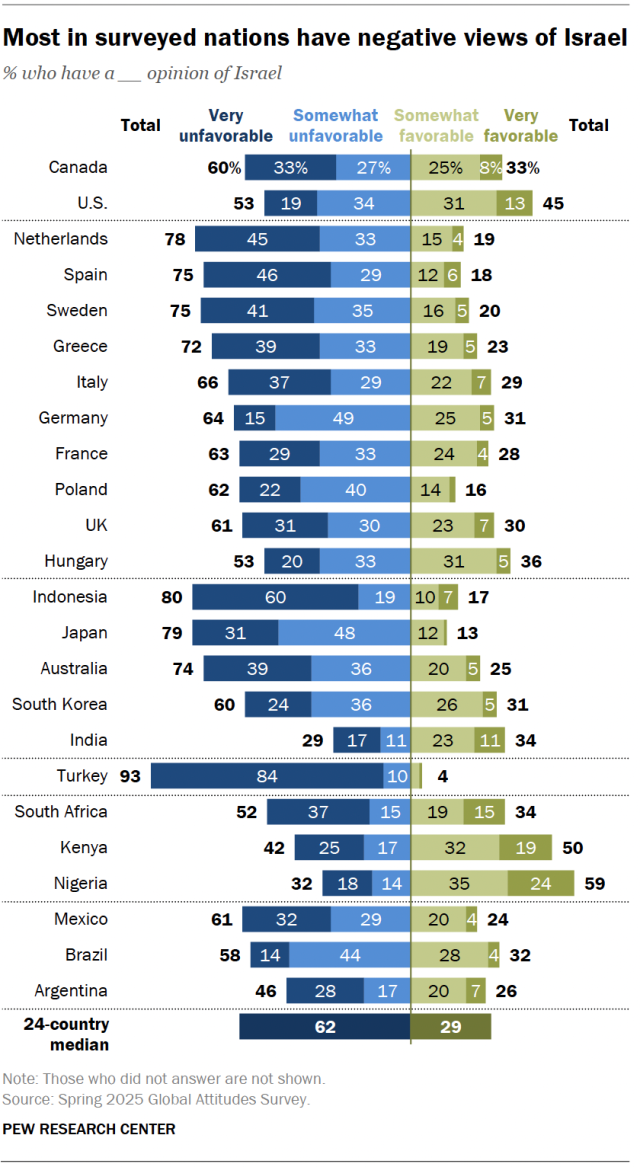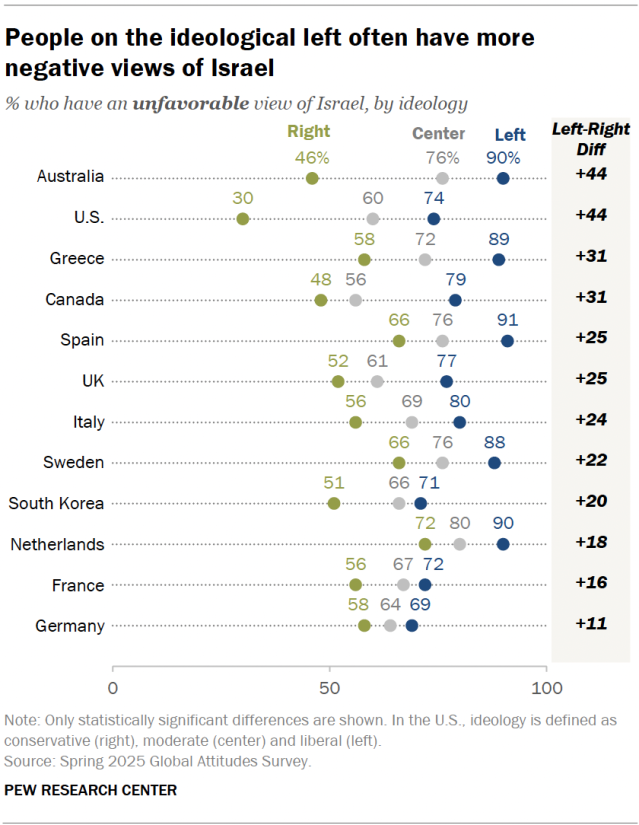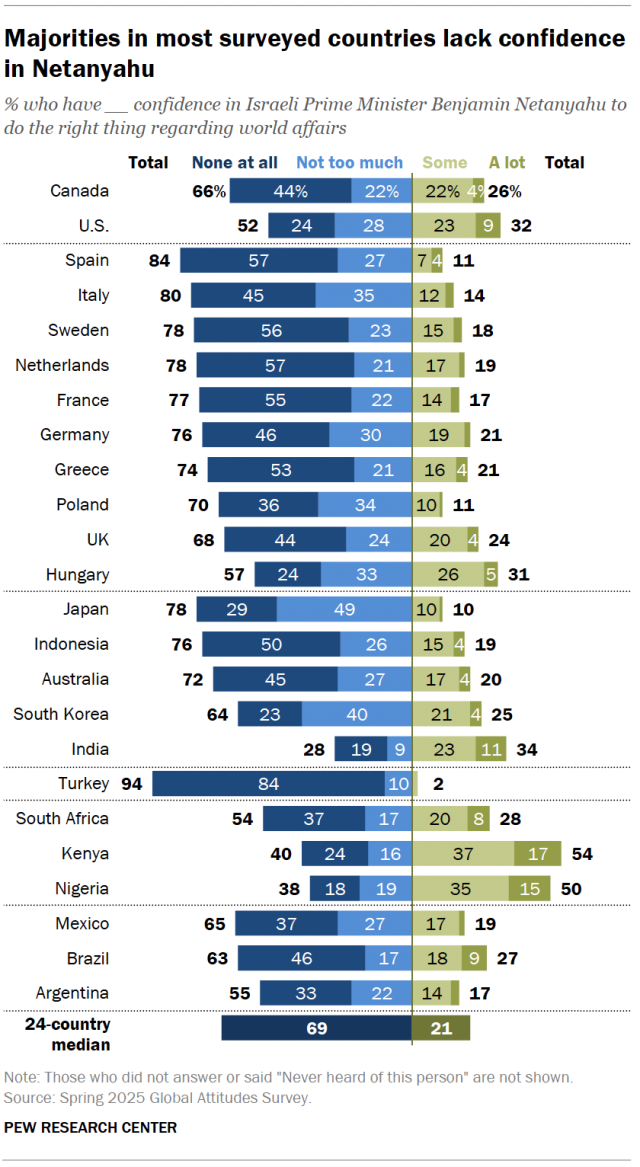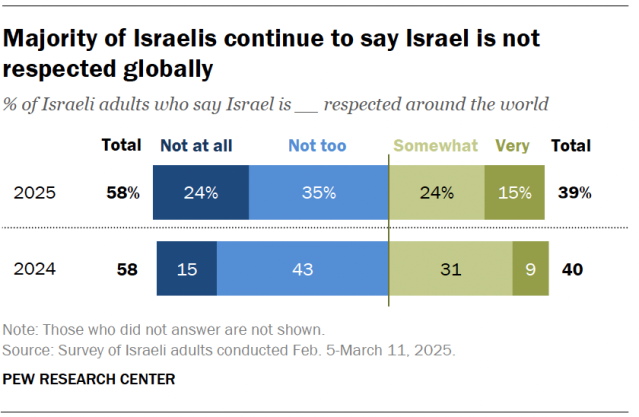
International views of Israel and Prime Minister Benjamin Netanyahu are much more negative than positive, according to a Pew Research Center survey of 24 countries conducted this spring.
Israelis, for their part, tend to say their country is not respected internationally: 58% say Israel is not too or not at all respected around the world, while 39% think it is.
International views of Israel

In 20 of the 24 countries surveyed, around half of adults or more have an unfavorable view of Israel. Around three-quarters or more hold this view in Australia, Greece, Indonesia, Japan, the Netherlands, Spain, Sweden and Turkey.
Views of Israel are fairly divided in India (34% favorable, 29% unfavorable).
In Kenya and Nigeria, around half of adults or more have a favorable view of Israel.
How views have changed in recent years
The recent survey is not the first time Pew Research Center has asked about international views of Israel. We have asked about views of Israel before in some countries – including in the United States, where the share of adults with a negative view of Israel rose 11 percentage points between March 2022 and March 2025.
In 10 other countries, we last asked this question in 2013. In seven of these countries, the share of adults with a negative view of Israel has increased significantly. In the United Kingdom, for example, 44% had an unfavorable view of Israel in 2013, compared with 61% now. (In Nigeria, both the share of adults with a negative view of Israel and the share with a positive view have increased since 2013, due to a decline in the share saying they don’t know.)
Views by age
In some countries, younger people are more likely than older people to have an unfavorable view of Israel. This is particularly the case in the high-income countries surveyed: Australia, Canada, France, Poland and South Korea and the U.S. In fact, the U.S. has one of the largest age gaps in views of Israel.
Views by ideology

In many countries where we asked about political ideology, people who place themselves on the left have a more negative view of Israel than those on the right. In Australia, for example, those on the left are about twice as likely as those on the right to have an unfavorable opinion (90% vs. 46%). The ideological gap in the U.S. is also one of the largest of the countries surveyed; 74% of liberals have a negative view of Israel, compared with 30% of conservatives.
International confidence in Netanyahu

Confidence in Israel’s prime minister is low in most surveyed countries. Outside Kenya and Nigeria, no more than around a third of adults in any surveyed country have confidence in Netanyahu to do what’s right regarding world affairs.
Confidence in Netanyahu is particularly low in Australia, France, Germany, Greece, Indonesia, Italy, Japan, the Netherlands, Spain, Sweden and Turkey, where around three-quarters of adults or more have little or no confidence in him. In some of these countries, a majority say they have no confidence in him at all.
Views by age
As with views of Israel, confidence in Netanyahu varies by age in some countries, with younger people expressing less confidence than older people. In Hungary, for example, adults ages 50 and older are twice as likely as those ages 18 to 34 to have confidence in him (40% vs. 20%).
Views by ideology
In several countries, people on the ideological right are much more likely than those on the left to have confidence in Netanyahu’s handling of world affairs. In France, for example, 25% of those on the right have confidence in him, compared with 12% of those in the ideological center and 8% of those on the left.
Do Israelis feel their country is respected internationally?
More Israelis say their country is not too or not at all respected around the world (58%) than say it is somewhat or very respected (39%). These views are largely unchanged since last year. But the share of Israelis who say their country is not at all respected has increased 9 points since then, from 15% to 24%.

As was the case last year, there are large ideological differences among Israelis on this question. Israelis on the ideological right (49%) are more likely than those on the left (24%) to say their country is respected abroad. Israeli Arabs and Israeli Jews are equally likely to say that the country is respected internationally, also consistent with last year.
For more on Israelis’ views of their political leaders and other key issues, read our new report: “Israeli Public Is Increasingly Skeptical About Lasting Peace.”
Note: Here are the questions used for this analysis, along with responses, and its methodology.
